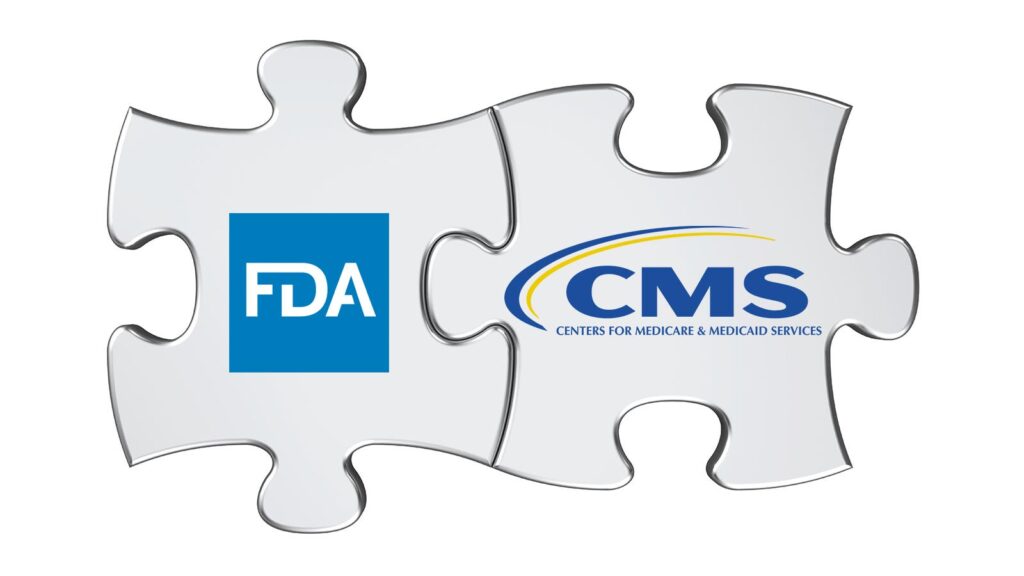Fleisher is an emeritus professor of anesthesiology and critical care, and a former CMS Chief Medical Officer and director of the Center for Clinical Standards and Quality.
Over the last 30+ years of helping to shape national healthcare policy and care delivery, I have witnessed rapid innovation in care modalities across the healthcare ecosystem. In my career, I’ve seen that the rules guiding healthcare innovation play a big role in pushing the market toward patient-centered care. They do this by encouraging adoption while keeping a focus on patient safety and ensuring access. As you likely already know, the two agencies with some of the greatest authorities and responsibilities to the patient are CMS and FDA.
The FDA and CMS bear the responsibility of adapting to meet the perpetual growth of medical discovery. The agencies do this by examining their own practices of information-sharing and by ensuring clarity on the evidence of safety and efficacy needed to approve a drug or device, as well as by evaluating the evidence to make sure it’s appropriate for specific populations. During my tenure at CMS, the agency introduced the proposed Transitional Coverage of Emerging Technologies (TCET) pathway for breakthrough devices, a step toward affirming the agency’s commitment to getting reasonable and necessary devices into the appropriate patients’ hands quicker than ever before without compromising on patient safety.
I see TCET as the beginning of a series of needed changes to CMS and FDA’s approaches to drug and device approvals that preserves each agency’s distinct responsibility and mission while also helping the agencies better work in tandem to serve patient needs. Particularly as it pertains to FDA collaboration with CMS, I see the FDA as the steward for safe and effective determinations that allow CMS to make informed reasonable and necessary coverage determinations. This has worked well for the current surrogate endpoints used in HIV and cancer for FDA-accelerated approval.
Looking forward, establishing more standardized and predictable communication between agencies can significantly bolster their capacity to evaluate evidentiary standards for novel surrogate endpoints to ensure the right drugs and devices get to the right patients. Leveraging novel surrogate endpoints in accelerated drug approval through joint CMS/FDA/NIH collaboration would provide clarity on definitions, and ensure these novel surrogate endpoints also meet the reasonable and necessary requirements for coverage. In cancer therapy specifically, newer diagnostic tests such as ctDNA will require consensus on when these markers meet the reasonable and necessary criteria. This will require active collaboration amongst appropriate federal stakeholders.
Another aspect of collaboration that I believe will be critical between the FDA and CMS will be for the FDA to more rigorously seek evidence that reflects a more diverse patient population, such as CMS’s Medicare population. FDA drug and device approvals are often based on trial populations that may not not reflect the demographics of Medicare patients. If CMS were to provide an active feedback channel to the FDA on the real-world evidence gathered either from a full drug approval or under a requirement for more evidence after approval, this would benefit the FDA in its post-market surveillance. I see such a collaboration as both a necessary tool in the promotion of patient safety as well as an affirmation of the need for greater solvency of the Medicare Trust Funds.
The exchange of data between regulatory agencies — based on an understanding of roles and responsibilities, as well as upcoming decision points and the accompanying data — is both a hallmark of good governance and a critical component of informed clinical decision-making. The task at hand is not merely keeping pace with innovation but also fostering an environment where groundbreaking treatments flourish. This environment of inspired innovation must be supported while also appropriately regulated to ensure continuous collection of evidence to inform appropriate treatment decisions that are safe and effective as well as reasonable and necessary.
Lee A. Fleisher, MD, is emeritus professor and former chair of anesthesiology and critical care at the University of Pennsylvania in Philadelphia, and founding principal at Rubrum Advising. He also serves as a senior advisor of FasterCures and the Bipartisan Policy Center, and as a visiting fellow of the Duke-Margolis Center. He was the Chief Medical Officer and director of the Center for Clinical Standards and Quality for CMS from 2020-2023. He is a member of the National Academy of Medicine and serves on the Board of Health Services.
Disclosures
Rubrum Advising advises companies on Medicare and private insurance coverage of new technologies, including current advising for device and diagnostic companies (none have applied for the TCET pathway). The company is not currently advising any drug companies.
Please enable JavaScript to view the

